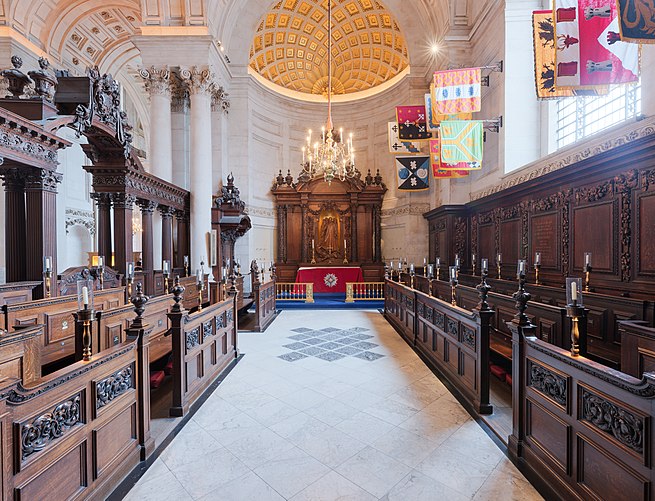-
Chapel
A chapel is a Christian place of prayer and worship that is usually relatively small, and is distinguished from a church. The term has several senses. Firstly, smaller spaces inside a church that have their own altar are often called chapels; the Lady Chapel is a common type of these. Secondly, a chapel is a place of worship, sometimes non-denominational, that is part of a building or complex with some other main purpose, such as a school, college, hospital, palace or large aristocratic house, castle, barracks, prison, funeral home, cemetery, airport, or a military or commercial ship. Thirdly, chapels are small places of worship, built as satellite sites by a church or monastery, for example in remote areas; these are often called a chapel of ease. A feature of all these types is that often no clergy were permanently resident or specifically attached to the chapel. Finally, for historical reasons, chapel is also often the term used for independent or nonconformist places of worship in Great Britain—outside the established church, even where in practice they operate as a parish church.The earliest Christian places of worship are now often referred to as chapels, as they were not dedicated buildings but rather a dedicated chamber within a building. Most larger churches had one or more secondary altars which, if they occupied a distinct space, would often be called a chapel. In Russian Orthodox tradition, the chapels were built underneath city gates, where most people could visit them. The most famous example is the Iberian Chapel.
Although chapels frequently refer to Christian places of worship, they are also commonly found in Jewish synagogues and do not necessarily denote a specific denomination. In England—where the Church of England is established by law—non-denominational or inter-faith chapels in such institutions may nonetheless be consecrated by the local Anglican bishop. Non-denominational chapels are commonly encountered as part of a non-religious institution such as a hospital, airport, university or prison. Many military installations have chapels for the use of military personnel, normally under the leadership of a military chaplain.
-
Chapel (noun)
A place of worship, smaller than or subordinate to a church.
-
Chapel (noun)
A place of worship in a civil institution such as an airport, prison etc.
-
Chapel (noun)
A funeral home, or a room in one for holding funeral services.
-
Chapel (noun)
A trade union branch in UK printing or journalism.
-
Chapel (noun)
A printing office, said to be so called because printing was first carried on in England in a chapel near Westminster Abbey.
-
Chapel (noun)
A choir of singers, or an orchestra, attached to the court of a prince or nobleman.
-
Chapel (adjective)
Describing a person who attends a nonconformist chapel.
“The village butcher is chapel.”
-
Chapel (verb)
To cause (a ship taken aback in a light breeze) to turn or make a circuit so as to recover, without bracing the yards, the same tack on which she had been sailing.
-
Chapel (verb)
To deposit or inter in a chapel; to enshrine.
-
Church (noun)
A Christian house of worship; a building where religious services take place. from 9th c.
“There is a lovely little church in the valley.”
“This building used to be a church before being converted into a library.”
-
Church (noun)
Christians collectively seen as a single spiritual community; Christianity. from 9th c.
“These worshippers make up the Church of Christ.”
-
Church (noun)
A local group of people who follow the same Christian religious beliefs, local or general. from 9th c.
-
Church (noun)
A particular denomination of Christianity. from 9th c.
“The Church of England separated from the Roman Catholic Church in 1534.”
-
Church (noun)
Christian worship held at a church; service. from 10th c.
-
Church (noun)
A (non-Christian) religion; a religious group. from 16th c.
“She goes to a Wiccan church down the road.”
-
Church (noun)
assembly
-
Church (verb)
To conduct a religious service for (a woman) after childbirth. from 15thc.
-
Church (verb)
To educate someone religiously, as in in a church.

